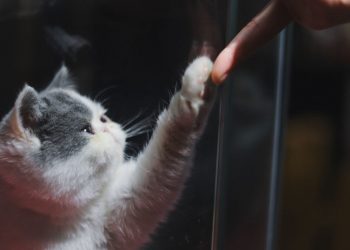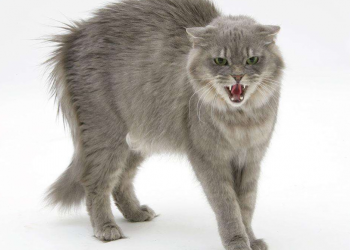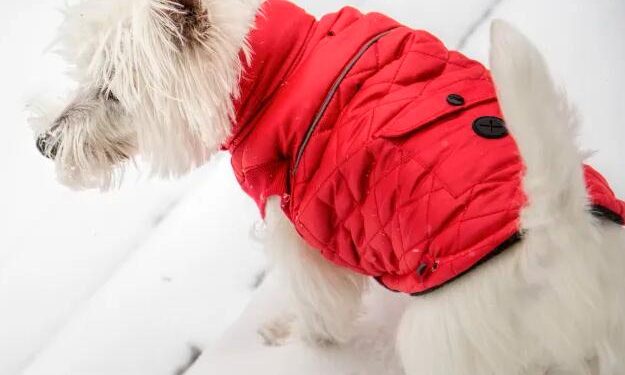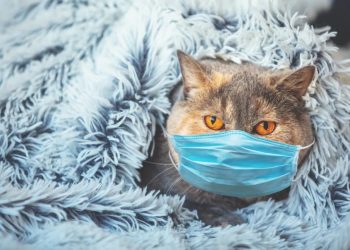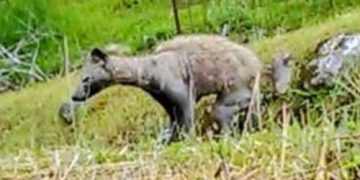As a pet owner, you want to do everything you can to care for your furry friend.
So when winter rolls around, it’s important to know the potential health hazards for pets that come with the colder temperatures.
Here are seven helpful tips to keep your pets safe this season.
1. Check your pet’s paws
If dogs or cats go outside in the winter, their paws may be susceptible to damage from salt or chemicals used to remove snow and ice.
Before you take your pet out for a walk, consider applying petroleum jelly or paw protectants to their feet.
You can even try putting on booties to protect your pup’s toes from damage or irritation.
2. Cold temperatures
Know your pet’s limits when it comes to cold weather. You may think their fur keeps them warm, but when the temperature drops, they’re still at risk for frostbite and hypothermia — particularly small dogs or those with short hair.
If you live somewhere with freezing temperatures, consider bundling up your pet before taking them outside. To prevent frostbite, don’t let your pet out for very long on snowy or icy days.
Besides hypothermia and frostbite, your pet may experience arthritis flare-ups due to the cold. Your pet’s tolerance to the cold depends on different factors including their coat, activity level and overall health.
3. Antifreeze and rodent poison
It’s not uncommon for animals to become interested in antifreeze’s sweet taste and smell.
However, this chemical is harmful to pets and can cause permanent damage if swallowed. Contact your vet immediately if you think your pet has ingested antifreeze.
Rodent poisons are around more frequently in the winter when rats and mice seek warm places to stay. While these traps are meant to attract vermin, your dogs and cats may be curious and want to take a bite. These poisons are highly toxic, so you must seek emergency care if you think your pet has eaten rodent poison.
4. Frozen bodies of water
When lakes, creeks and streams freeze in the early winter, it may be hard to tell how thick the ice is. To be safe, keep your pet on a leash to stop them from running onto the ice.
If your pet falls through the ice, don’t risk your safety by going onto thin ice to save them. Instead, call emergency services for help if you can’t reach your pet from the shore.
5. Car safety
Outdoor cats tend to look for warm places to snuggle in the winter, and finding them curled up under car hoods is a common occurrence.
Before you start your car, knock on the hood to alert any animal that it’s time to go.
Just as it’s unsafe to leave your pets unattended in a hot car during summer, it’s risky leaving them alone in a cold car during winter.
6. Nutrition and hydration
Make sure that your pet has enough water to drink, as this is a primary concern if they’re used to having food and water outside. Since outdoor water bowls can freeze into solid ice, keep your furry friend’s water inside where it’s warm.
Some owners give their pets extra food in the winter based on the belief that the “extra meat on their bones” will keep pets warm. However, overfeeding your pet could lead to health problems associated with being overweight. Instead, help your pet to maintain a healthy weight all year round.
It’s OK to give your dog or cat a holiday treat, as long as it’s in moderation. A few bites of skinless turkey or chicken from Christmas dinner are tasty for both dogs and cats.
However, make sure the meat doesn’t have any bones or seasonings like garlic or onion — both are toxic to pets. Additionally, avoid giving your pet foods like nuts, chocolate or desserts since these can also be dangerous to their health.
7. Holiday plants
While beautiful to look at, some holiday plants can be health hazards for your pets.
Plants like poinsettias, mistletoe, holly, pine and amaryllis can be toxic to dogs and cats if they eat them.
Try to keep them out of your pet’s reach, or opt for fake plants that look just as festive but are much safer to have around the house.

